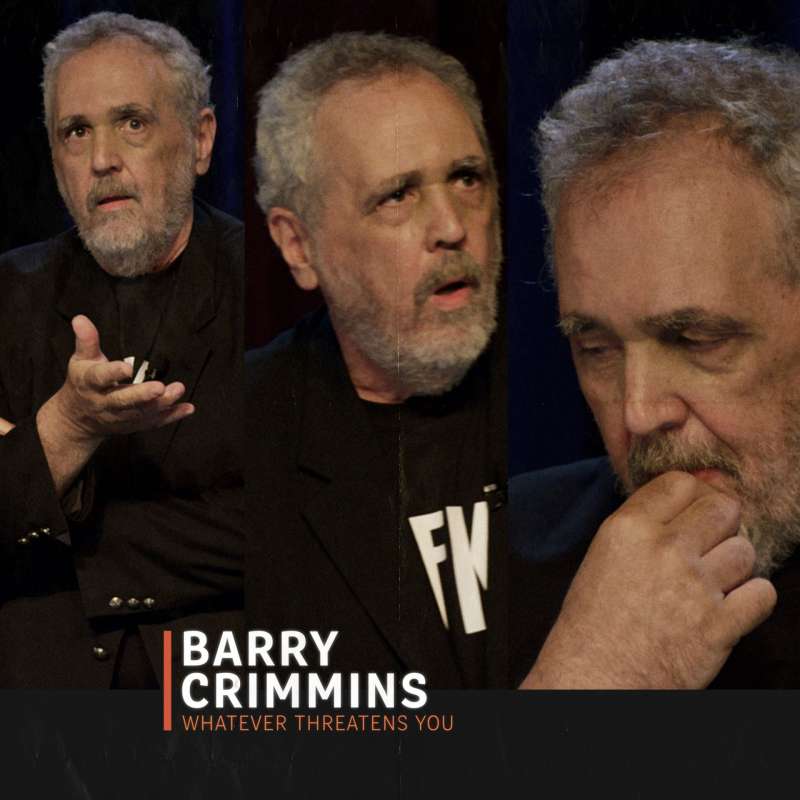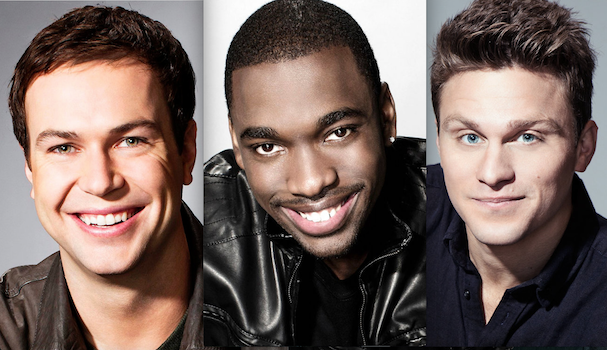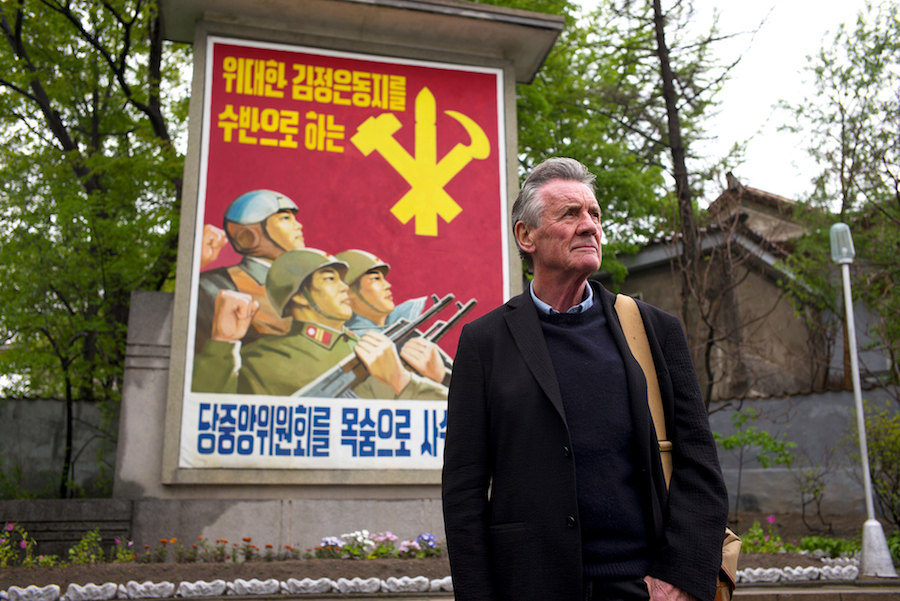Barry Crimmins calls his new stand-up special, released in video and audio versions Sunday night by Louis C.K. (who directed and produced it), the “Best spesh by a progressive, rabble-rousing, bigot-baiting,trauma-surviving comic this week!!”
Here’s what CK had to say about releasing Barry Crimmins: Whatever Threatens You (it’s his third release for someone else following a CD for Tig Notaro and a documentary tour film for Todd Barry), and also a note on the passing of fellow legendary Boston comedian Kevin Meaney:
I’m writing you today because I’m offering something new on my website. This time it’s not me. It’s a great comedian named Barry Crimmins. Last summer I produced and directed Barry’s first live standup special. It’s called “Whatever Threatens You”. It costs the usual 5 dollars, and it’s really goddamn great. So please download it here.
Barry is a legend. A great mind, an author and activist and political satirist. He has been an important voice of passion and reason since the 1970s. He has stood before thousands of audiences of every size and type and told them the truth with wit and wisdom, with anger and compassion. Barry was a towering example to me when I started doing standup at age 18. He fostered the comedy scene that I cut my teeth on and later became my friend. More than all of that, I am his fan. I love his voice. He makes me laugh. He’s always right. There has NEVER been another comic like him.
The great thing about comedians is that they get better with time. And I feel very lucky to be bringing you Barry’s first standup special. I produced it and directed it and he worked incredibly hard over the last two years on the road shaping it and putting it together and he left every ounce of it on the stage when we filmed him. When you watch this special, you’ll be seeing a great comic and a prime and only example of what comedy is at it’s best. You’ll see a comedian who cares about what he is saying and who brings integrity and experience and an unmatched skill as a writer to his performance.
About two years ago, Bob Goldthwait, a good friend of Barry’s, produced a documentary about him titled “Call Me Lucky”. It covers a whole other part of Barry’s life where he made a huge impact.
Barry was a victim of sexual abuse when he was very little. He turned around his personal pain to help others by challenging the power companies of the internet to police child pornography, testifying before Congress and championing victims everywhere by sharing his own story. You should look for this movie on Netflix. It’s great and also includes great footage of Barry’s early work as a standup.
“Call Me Lucky” was shown at the Sundance Film festival last year and Barry was there to receive a thunderous standing ovation from the audience. He called me that night and we talked for hours about life and about comedy. I told him that I wish more people knew how great he is. I made him a promise that if he went on the road and built a solid hour I would shoot it for him and put it on my site. He took me up on it. I told him he could shoot it anywhere in the country he wanted. He chose Lawrence, Kansas. So we flew the crew into Lawrence and shot this special.
There are a lot of standup specials out there right now. On Netflix, on iTunes, HBO, whatever. But you won’t see another like this.Go here now to download it for 5 dollars. Or keep reading if you want to know more.
I met Barry when I started doing Standup comedy in Boston in 1985. As a kid, I loved standup. And I dreamed of being a comedian. But living in suburban Boston, I never would have found a path to actually being a comedian if it weren’t for Barry. Because years before I started, Barry had been creating a standup scene where there wasn’t one before. I loved Steve Martin, Richard Pryor, Eddie Murphy, George Carlin and my new favorite at the time, Steven Wright. What I didn’t know is that Steven Wright was from Burlington Mass, a few miles from me, and that he had cut his teeth and found his path to fame in Boston Mass, which was a five minute drive down the Mass Turnpike, which ran noisily behind my house.
I probably would have stayed just a kid with a yearning and grown into a man with no skills and would have had no choice but to rob old ladies to make my living. But one day I was listening to the radio and they said “If you want to be a comedian come down to Stitches Comedy club on Comm Ave for the open mic night. All you have to do is sign up and you get five minutes on stage.”
About a month later, I got the courage to go down there and try it. What I discovered was that Boston had a massive, thriving standup scene. There were four full time standup clubs, (Stitches, Play it Again Sams, Nicks, The Comedy Connection) which were packed seven nights a week, and an ever shifting constellation of satellite rooms and one-night gigs, spread all along New England, all populated with Boston Standups. Like Ray Liotta says in Goodfellas, “It was a glorious time, and wise guys were everywhere.”
The standard for talent in the Boston Comedy scene was about here: Juliard-level performance skills and Mark Twain-level writing. You could walk into any comedy club in Boston and see any random comedian and the worst of them were polished, original and absolutely killed. And when you were lucky, which was often, because these guys worked like oxen, you could see a comedian that was better than ANYONE you ever saw on TV or anywhere else. Guys like Steve Sweeney, Jimmy Tingle, Don Gavin, Mike Donovan, Teddy Bergeron, Lenny Clarke, Ron Lynch, Joe Yanetty, Kenny Rogerson, DJ Hazard, Mike McDonald.
I’m not even close to covering the list here. And there were new younger comics who were hot and developing under the wings of and in the wake of these giants. Dana Gould, Tom Kenney, Paul Kozlowski, Billy Martin, Rich Ceisler, Frank Santarelli, Fran Salomita, Ed Driscoll, Zito and Bean, Fred Wilson, Tony V, Denis Leary. Every one of these comics and FAR more, too many to list, was working every night in the thriving comedy clubs around the city. Even open mic nights were packed with expectant crowds and populated by solid, new comedians who had a ridiculously high bar to meet, set, not by the famous comedians on TV and in movies, but by the local headliners who they had to follow.
The gravity of all of this pulled me in at age 18 and when I peeked inside the Boston comedy clubs, my jaw dropped at what was there. At how good these guys were and how much opportunity there was for a new young comic.
I came in to the Boston scene along with Marc Maron, Nick Dipaolo, David Cross, Laura Kightlinger, Janine Garafolo, Wendy Leibman, Sam Seider, John Benjamin, Jonathan Groff, Brian Frazier, Amir Gollan. Some of these you’ve heard of, some you haven’t.
I got to know every comedian in Boston and I still know all their jokes by heart. I went to clubs every single night. I was a young annoying kid, and peppered them with questions about how they did what they did. And it wasn’t long before I myself was able to make a living doing what I loved and dreamed of, because of the structure created by these guys who welcomed me into their world, taught me and inspired me.
I’m NOTHING without Boston and without those comedians, all of whose names I hope you google after you read this.
There are two names that are vital to this story which I’ve so far left out. Barry Crimmins and Kevin Meaney. They were two guys from upstate New York who came to Boston and, among other guys, were the ones who made all of this happen. I don’t know the whole story, or even most of it, because I was in Junior High when it happened, but Barry, Kevin, a guy named Mike MacDonald, and a bunch of the guys on the top list of this email, started the Boston Comedy scene about eight years before I dropped into it, in a tiny Chinese restaurant in Inman square called the Ding Ho. They did shows there every night and there was always a line around the block. By the time I started, the Ding Ho had closed down, (the owner had gambling debts) but the scene had exploded into what I discovered.
Barry Crimmins was like the godfather of the whole thing. He was an intense, dark man with a full beard and glaring eyes. He was like a bear. Like a genius animal raised in the wilderness, who was educated at Oxford. He smoked cigars and drank beer and growled about Ronald Reagan. I was TERRIFIED of Barry when I was a new young comic. The general sense that was palpable when Barry was at a club, was that all these great comics looked to him. That he set the bar for creativity. There was a standard in Boston. You had to be original. You had to have an idea. You had to be creative. You had to write. That came from Barry Crimmins.
Because without Barry, as great as the comedy was in Boston, it largely followed the character of the city itself. There was a lusty, drunk, bitter energy to every show. A lot of comics would go on stage and tell stories about getting drunk and talk about the local sports teams and about getting laid. All worthy subjects. And the drunk crowds would laugh heartily, often shout back at the stage. There was a dangerous energy to every show and you always had a feeling that if you didn’t get laughs, you might get the shit beat out of you after a show. Comedians even fought each other. It was a rowdy scene. But when Barry went on stage, people listened. Every comedian in the room would face the stage and watch him and listen. He was brilliant and compelling and he was “fuckin’ Smaht”. And he gave a bit of that to everyone else. He was also funny as hell. His jokes were sharp. He had a wicked fast ball, like Dennis Eckersly. He would explain the truth of a global situation and lay the groundwork through a quick education of the human condition and then ignite the atmosphere with a crackling joke. You’d laugh and say “Oh my god.” As a new idea would explode in your mind along with the laugh from your body.
Later in life I became good friends with Steven Wright, who is also very close to Barry. Steven told me a lot about the Ding Ho, where he started. He told me how scared he was to be a comedian, at the same time as he wanted to be one. There was so much about it that ran against his personal nature (which is part of why he’s great to watch) and how all the comedians at the Ding Ho, including Barry, taught him and encouraged him. My experience starting out was the same and that idea of teaching, mentoring and passing down a creative tradition, was fostered by Barry.
Kevin Meaney is someone you may have heard of. You also may have heard that he died on Friday. He was 60. Kevin was the gravity that pulled me into the scene.
Kevin was the most naturally funny comedian I ever saw. Every word he said was insanely hilarious. He had a funny voice, face and rhythm to his speech. But he had a childish courage that was goddamn inspiring. Whenever Kevin would bomb, and sometimes he would, he would start to sing a song “I don’t care! I don’t care! My jokes don’t go over I don’t care! I don’t care! I don’t care! IIII DOOON’T CAAARE!” I don’t care! I don’t care!” and he would sing this song, in Ethyl Mirman’s voice, for sometimes 30 minutes. The crowd would be FURIOUS. I and any other comedian in the room would be literally on the floor, laughing, crying, gasping for air.
Kevin had a surge of fame right around the time that I met him in the mid 80s. He was given a shot on Letterman and it went so well that Johnny Carson demanded he come on his show and do the exact same set. I remember being at Play it Again Sams. We shut the showroom down and pretty much every comedian in Boston packed into the back bar to watch Kevin on Carson on a tiny TV that hung over the bar. We were so proud of him. Later he was on SNL and had his own show (Uncle Buck), and the whole country fell in love with his standup like I did. So he was also an example of what you could accomplish if you worked as hard as he did and were as wonderfully original and great.
Barry and Kevin were very close friends. They worked at the Ding Ho together. They built and shaped the Boston scene together.
I loved every comedian in Boston. I really did. I still do. But Barry, for me, created the idea that comedy could be great and mean something. And Kevin used to hurt my stomach and he made me believe there was NOTHING you couldn’t do on stage if you have the SKILL. He was outrageous and obnoxious stupid and childish and it all worked because he was blindingly good and musical and smooth and perfect and joyful in every show he did.
Where Barry taught us that there was a smart, profound integrity to be mined in comedy – that you could speak truth and be funny. That Standup was an art, that it was a form of literature and political and social insurgence and still be just goddamn funnny and sound like that guy you love listening to at the end of the bar you go to after work.Kevin taught us that you can reach down into your very babyhood and just be as silly and insane as you want, that you can smash the structure and just talk like your mother and sing Wayne Newton and scream and sing and if you carry that off with confidence and skill, the audience will follow you everywhere.
Another thing I learned from Barry and an element he brings to comedy that is very rare. This is important:
A lot of comedy is a defense. A shield or an arrow shot by a wounded person into a cruel world. A lot of comedy is about not giving a shit. Or trying not to. Or acting like things don’t hurt. Or like it doesn’t matter that it hurts when it does.In Barry’s very face as he talks you can see that life hurts. And that he’s acutely aware of human suffering. Of lies and pain. And that it matters to him. He is angry because he loves human beings. And he gives you all of his feelings in all of his vulnerability even as he survives and laughs and makes us laugh.
So… it was really these two guys, Barry and Kevin, who shaped me as the comedian I am today and who gave me the opportunity to work at it and do it for myself. And I am ETERNALLY grateful to have gotten to call them both my friends. One of them I lost on Friday. The other one, I bring to you here.
I learned that Kevin died when I wrote Barry to ask him for some bio information that I could use to write this email to introduce his special. He wrote me back…
“No easy way to say this but I just received word that Kevin Meaney died, apparently of a heart attack. I will get to this ASAP but I just learned of this five minutes ago and he was one of my dearest, dearest friends and I’m pretty fucked up at the moment.”I was shocked and heartbroken. Yesterday, Barry and I discussed delaying the premiere of his special, which has been scheduled for today for a while. We struggled with what to do. Obviously, we decided to release it on schedule. The deciding factor was that Barry told me that Kevin, who he talked to frequently, was very excited to have this come out. He was excited for Barry and for people to finally see his friend in all his glory.
I’m also not regretful to have this opportunity, though it’s messy in timing, to tell you how I feel about my friend and mentor who is gone at the same time I can tell you how I feel about my friend and mentor who lives on and to bring you his work and his voice and his greatness.
Goodbye Kevin.
Ladies and Gentlemen, Barry Crimmins…
Barry Crimmins: Whatever Threatens You is available for download for $5 at LouisCK.net.




One thought on ““Barry Crimmins: Whatever Threatens You,” released by Louis C.K.”
Comments are closed.